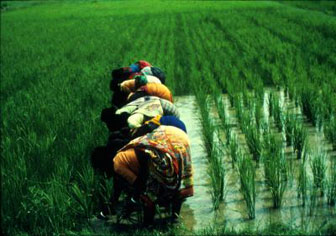Fighting air pollution could feed the hungry in India
Fighting air pollution could feed the hungry in India
mongabay.com
December 4, 2006
Reducing human-generated air pollution could create agricultural benefits in India according to research published by University of California scientists in the current online issue of the journal Proceedings of the National Academy of Sciences (PNAS).
Analyzing historical data on Indian rice harvests and comparing it with pollution records, Maximilian Auffhammer of UC Berkeley and V. “Ram” Ramanathan and Jeffrey Vincent of UC San Diego, found that Indian crop harvests would have been 20 to 25 percent higher during some years during the 1990s if the negative climate impacts from air pollution had not occurred.
A news release from the University of California at Berkeley explains:
-
[The researchers] analyze historical data on Indian rice harvests and examine the combined effects of atmospheric brown clouds and greenhouse gases on growing conditions. They find that the combined effects were negative and were greater after the mid-1980s than before, coinciding with the observed slowdown in harvest growth…
 Farmers harvesting rice in India. Credit: Photo courtesy of the International Rice Research Institute . |
Previous research by an international scientific team led by Ramanathan, professor of atmospheric sciences at Scripps Institution of Oceanography, found that brown clouds have made the Indian subcontinent drier and cooler. Although this suggests the existence of a climatic tradeoff, with reductions in aerosols potentially unleashing a stronger warming trend, the current study indicates that joint reductions in the two types of pollutants would, in fact, benefit Indian rice farmers. This is because reductions in aerosols would enhance rainfall, while reductions in greenhouse gases would reduce the higher nighttime temperatures that can negatively affect the growth of the rice plant.
“Greenhouse gases and aerosols in brown clouds are known to be competing factors in global warming,” said Ramanathan. “The major finding of this interdisciplinary study is that their effects on rice production are additive, which is clearly an unwelcome surprise.”
The researchers say that cutting air pollution could help improve living conditions for the poor across Asia.
“Our study provides an additional motivation related to the economic health of poor rural areas,” said Vincent.
“While this study focuses on India’s rain-fed states, ABCs exist throughout Asia’s main rice-producing countries, many of which have experienced decreasing growth rates in harvests, too. Furthering our understanding of how air pollution affects agricultural output is very important to ensure food security in the world’s most populous region,” added Auffhammer.
This article is based on a news release from PNAS.